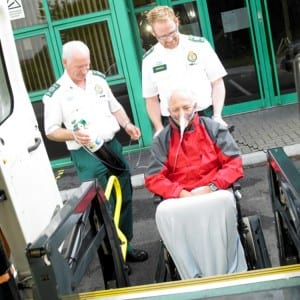Professor Niro Siriwardena from the Community and Health Research Unit joined study lead, Professor Philip Bath, and Dr Sandeep Ankolekar (from the University of Nottingham) together with a team from Nottingham University Hospitals and East Midlands Ambulance Service (EMAS) NHS trusts to complete the first ever randomised trial worldwide of paramedic treatment of ultra-acute stroke, the RIGHT trial published in the journal Stroke.
There is a strong link between (both high and low) blood pressure in patients in the early stages of stroke and future death and disability. Glyceryl trinitrate (GTN) or nitroglycerin, which is more commonly used in the treatment of angina or heart attack, was administered by paramedics from EMAS as a skin patch to lower blood pressure in the RIGHT (Rapid Intervention with GTN in Hypertensive Stroke) trial.
The trial was designed to test the safety of GTN in ultra-acute stroke and the feasibility of paramedics diagnosing, consenting, randomising and treating intervention patients in the emergency prehospital setting. In the study, published this month in the journal Stroke, 41 patients were randomised by 23 (out of 78) trained paramedics to GTN or no GTN.
Intervention patients had a significantly lower systolic blood pressure at two hours and also significantly improved functional status at 90 days with treatment. Patients given GTN were no more likely to die or suffer and adverse event. GTN may act by lowering systolic blood pressure which may be harmful in acute stroke or through some other mechanism such as neuroprotection, immunoregulation or vasodilation of cerebral arteries or small blood vessels. The study will form the basis for future studies of ambulance-based trials of stroke.

